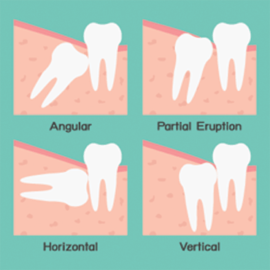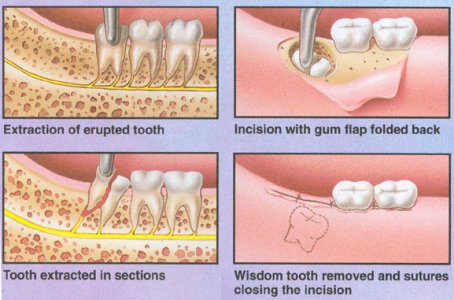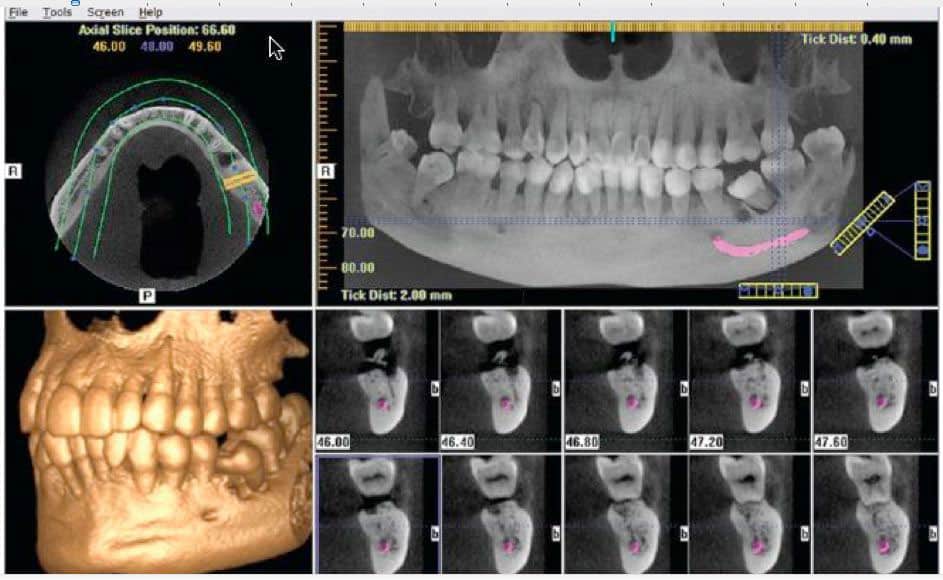
Is it really Necessary to remove wisdom teeth?
Is wisdom teeth removal necessary or do I have other options? Oral health care standards for the prevention of dental diseases have improved in the recent past due to increased awareness of the people and better treatment options at the dental clinics. People follow preventive advice before the occurrence of dental problems. They maintain their oral hygiene with the help of regular tooth brushing, use of dental floss and mouth rinsing. Infants,
toddlers and small children are brought to the dental offices for consultation visits as soon as milk teeth appear in their mouth. However, lifestyle modifications and improved dietary habits are needed. These days, Children do not like to eat hard foods. Increased intake of fast foods, soft diet and cola drinks causes decreased stimulation of jaw bone growth during early life when jaw development is underway. Restricted jaw growth is the major reason for impacted third molars/wisdom molars

wisdom tooth removal chevy chase md e1521161120640
What are third molars? Why these third molars are known as wisdom teeth?
Third molars or wisdom molars usually remain hidden within the gums or socket bone due to limited space or hindrance in their path of eruption. These are most commonly impacted teeth followed by second premolars and upper lateral incisors. Wisdom teeth are usually absent in a large number of individuals. Sometimes, wisdom teeth make their path within the small sized jaw bones or limited which results in their tilting, drifting, rotation. These tilted, drifted and rotated wisdom teeth badly affect adjacent teeth, jaw bone and nerves crossing near their roots and crowns. Furthermore, these can act as spaces accumulation of food debris which can result in infections, gum diseases and tooth decay in the future. Is wisdom teeth removal necessary always? No.
These teeth normally erupt around 17-25 years of age (late teenage years and early twenties). This age range is associated with the development of intelligence and learning in young ones. This is the reason why these third molars are called wisdom teeth.
Why third molars erupt late in the mouth/become impacted?
When jaw bone growth becomes restricted, it results in late eruption of teeth and this decreased size of jaws cannot accommodate all teeth within the mouth. Third molar teeth are located in the end of your mouth do not find enough space to erupt and remain within the gums and jaw bones. Little or no space does not allow these relatively large sized teeth to erupt through the jaw bone and gums. The diet has softened and people do not eat foods that are as hard. As a result Jaws are smaller and teeth do not have as much room to fit.

oral surgeon 1
Why is it necessary to remove wisdom teeth from the mouth in majority of cases?
Abnormally tilted, drifted and rotated wisdom teeth become the reason for the occurrence of food impaction, infection and swelling of gum tissues surrounding and covering these teeth. Food particles cannot be easily cleaned from these narrow spaces and pockets around the wisdom molars leading to development of reddish, swollen and infected soft tissues which become extremely painful especially when patient tries to open wide. Normal tooth brushing and mouth rinsing becomes less beneficial when the problem becomes severe.
Severe pain, infection, fevers and reduced mouth opening develops in severe cases. You will be unable to eat, talk and perform your daily activities. Do all wisdom teeth need to be removed? Not always.
Novel treatments such as PRF wisdom teeth surgery, help accelerate bone healing and reduce swelling and pain after wisdom teeth removal.
Removal of these affected teeth becomes essential for the prevention of infection spread. Exposure and removal of surrounding jaw bone and gums may be needed. American Dental Association recommends complete and comprehensive consultation regarding the status of wisdom teeth buds in infants or around 16-19 years of age. Their early removal following preventive approach can save future complications.
Can I keep my wisdom teeth if these are harmless?
Yes. If your wisdom teeth have erupted normally and your jaw bones have enough space, you do not need removal of these teeth. Another condition which does not necessitate removal of wisdom teeth is when these teeth are buried deep down within the bone and their removal can result in loss of too much healthy bone causing weakening and danger of jaw bone fracture. Bottom line is, if you can keep the wisdom teeth clean. If the teeth fit in your mouth and if wisdom teeth are not causing bite problems and TMJ…You can keep your wisdom teeth.

3d xray Cone Beam north bethesda
Complications of Retained Impacted Wisdom Teeth?
- Pain, discomfort and swelling in gums around wisdom teeth,
- Limited/reduced mouth opening.
- Repeated infection of area behind wisdom molars,
- Formation of cysts around wisdom molars,
- Tumors,
- Pericoronitis (soft tissue infection around wisdom teeth),
- Tilted wisdom teeth can damage adjacent teeth causing decay (most commonly second molars),
- Stiffness around the impacted tooth,
- Cheek bite may occur when upper wisdom teeth are tilted towards cheeks,
- Crowding and malocclusion of other teeth,
- Bone loss,
- Inflamed gums,
- Sinus problems,
- Jaw damage.
Is Removing Wisdom Teeth Safe?
Wisdom tooth removal surgery required the services of an expert oral surgeon. Surgery should be performed after complete evaluation and comprehensive examination with the help of X rays, CT scan and CBCT scan for ensuring least trauma, damage and injury. Normal recovery time after wisdom tooth removal is around 7-10 days. It usually depends upon the degree of severity of tooth impaction, portion of tooth within jaw bone and closeness with adjacent tooth.
Can I do a surgery to keep my wisdom teeth? Do I have to remove my wisdom teeth? It depends, but rarely is it advisable to do surgery to keep wisdom teeth.
What complications can occur after wisdom tooth removal surgery?
- Pain and discomfort,
- Post-operative swelling,
- Fever,
- Restricted mouth opening,
- Prolonged bleeding,
- Delayed healing,
- Nausea and vomiting,
- Nerve damage leading of loss of sensations and numbness of associated area.
What should be done to promote speedy recovery after wisdom tooth surgery?
What is the recovery period for wisdom teeth removal surgery?
Important instructions which should be followed after wisdom tooth surgery are,
- Bite down firmly on the gauze pack placed by your oral surgeon over the empty third molar tooth socket for at least 30 minutes,
- Take ice cream soon after removing the gauze pack,
- Take ice cream without peanuts i.e. peanuts lodged as foreign body can delay wound healing,
- Chances of swelling can be minimized by placing ice packs over the area for first 24 hours,
- Painkillers can prevent pain and discomfort after the effect of local anesthesia wears off,
- Avoid vigorous spitting, sneezing or coughing,
- Never smoke after surgery,
- Do not use straw for drinking juices or milkshakes to avoid dislodgment of blood clots,
- Soft, cold and non-spicy foods must be taken,
- Restrict your physical activities,
- Ensure complete bed rest for a week,
- Avoid repeated touching and licking empty tooth socket,
- Rinse with lukewarm saline water rinses 4-5 times a day after a day to flush out food debris for soothing effect and infection prevention,
- Oozing out of few blood drops for a few days is normal. Do not panic.
- If bleeding remains persistent, firmly bite on a damp tea bag/cotton and visit your oral surgeon immediately,
- Visit your oral surgeon for removal of silk sutures after a week if advised.

 (301) 421 1996
(301) 421 1996 burtonsvillesmiles@gmail.com
burtonsvillesmiles@gmail.com